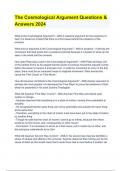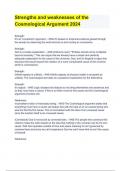The cosmological argument - Study guides, Revision notes & Summaries
Looking for the best study guides, study notes and summaries about The cosmological argument? On this page you'll find 167 study documents about The cosmological argument.
All 167 results
Sort by
What is the Cosmological Argument? - ANS-A classical argument for the existence of God, it is based on a belief that there is a first cause behind the existence of the universe
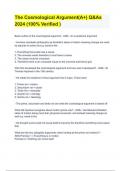
-
The Cosmological Argument(A+) Q&As 2024 (100% Verified )
- Exam (elaborations) • 4 pages • 2024
-
- £6.16
- + learn more
Basic outline of the cosmological argument - ANS-- An a posteriori argument - Involves scholastic philosophy as Aristotle's ideas of motion meaning change are used by aquinas in prima via e.g. wood to fire 1. Everything that exists has a cause 2. The universe exists therefore it must have a cause 3. The cause must be uncaused 4. Therefore there is an uncaused cause to the universe and that is god
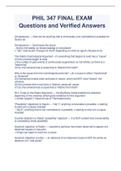
-
PHIL 347 FINAL EXAM Questions and Verified Answers | Latest 2023/2024
- Exam (elaborations) • 15 pages • 2023
-
- £11.91
- 1x sold
- + learn more
PHIL 347 FINAL EXAM Questions and Verified Answers | Latest 2023/2024 Omnipotence --- God can do anything that is intrinsically (non-contradictory) possible for God to do Omniscience --- God knows the future - God is immutable, so foreknowledge is nonexistent > *obj*: God would "change his mind" depending on what an agent chooses to do The Kalam Cosmological Argument --(1) everything that begins to exist has a *cause* (2) the universe began to exist > the number of past events is...
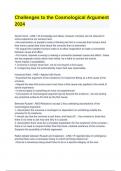
-
Challenges to the Cosmological Argument 2024
- Exam (elaborations) • 2 pages • 2024
-
- £6.16
- + learn more
David Hume - ANS-• All knowledge and ideas, however complex can be reduced to some experience our senses have. • His examination of people's mode of thinking led him to conclude that humans think they know a great deal more about the universe than is warranted. • He argued the mistake humans make is to allow imagination to make a connection between cause and effect. • For Hume, Aquinas is wrong in making a connection between cause and effect - these are two separate events rather t...
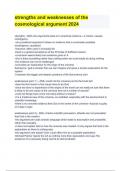
-
strengths and weaknesses of the cosmological argument 2024
- Exam (elaborations) • 2 pages • 2024
-
- £6.16
- + learn more
strengths - ANS--the arguments basis is in empirical evidence, i.e motion, causes, contingency. --as a posteriori argument it draws on evidence that is universally available (contingency, causation) -inductive: often used in everyday life -there is a general acceptance pf the Principle of Sufficient reason. -conclusion seems likely from evidence given in A -why is there something rather than nothing when we could easily be doing nothing -the evidence can not be challenged -it provides a...
Strength: It's an 'a posteriori' argument. - ANS-It's based on empirical evidence gained through the senses by observing the world around us and coming to conclusions.
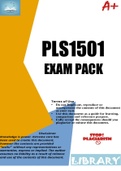
-
PLS1501 EXAM PACK 2023
- Exam (elaborations) • 81 pages • 2023
-
- £2.34
- 3x sold
- + learn more
October/November 2020 PLS 1501 Introduction to Western Philosophy 100 Marks Duration: 24 Hours This paper consists of 2 pages including this cover page. Instructions: Your exam consists of 3 QUESTIONS. SECTION A which consists of ONE QUESTION is COMPULSORY and counts 50 marks You can choose to answer ANY TWO of the FOUR QUESTIONS under SECTION B All 3 answers must be submitted as part of A SINGLE word file/ text DOCUMENT. Please remember to download the plagiarism declara...
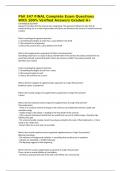
-
Phil 347 FINAL Complete Exam Questions With 100% Verified Answers Graded A+
- Exam (elaborations) • 6 pages • 2024
-
- £8.54
- + learn more
Phil 347 FINAL Complete Exam Questions With 100% Verified Answers Graded A+ Cosmological argument Argues for the idea that the universe has a beginning. This argument follows the idea that all empirical things are in a state of generation and decay and therefore the universe is material and was created. Plato's cosmological argument premises 1.) everything that begins to exists has a cause distinct from itself 2.) the universe has a beginning 3.) hence the universe has a cause distinc...
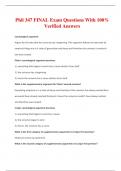
-
Phil 347 FINAL Exam Questions With 100% Verified Answers
- Exam (elaborations) • 11 pages • 2024
- Available in package deal
-
- £9.44
- + learn more
Phil 347 FINAL Exam Questions With 100% Verified Answers Cosmological argument Argues for the idea that the universe has a beginning. This argument follows the idea that all empirical things are in a state of generation and decay and therefore the universe is material and was created. Plato's cosmological argument premises 1.) everything that begins to exists has a cause distinct from itself 2.) the universe has a beginning 3.) hence the universe has a cause distinct from itself What ...
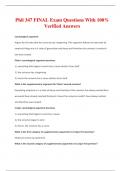
-
Phil 347 FINAL Exam Questions With 100% Verified Answers
- Exam (elaborations) • 11 pages • 2024
- Available in package deal
-
- £10.27
- + learn more
Phil 347 FINAL Exam Questions With 100% Verified Answers Cosmological argument Argues for the idea that the universe has a beginning. This argument follows the idea that all empirical things are in a state of generation and decay and therefore the universe is material and was created. Plato's cosmological argument premises 1.) everything that begins to exists has a cause distinct from itself 2.) the universe has a beginning 3.) hence the universe has a cause distinct from itself What ...

Did you know that on average a seller on Stuvia earns £76 per month selling revision notes? Hmm, hint, hint. Discover all about earning on Stuvia

